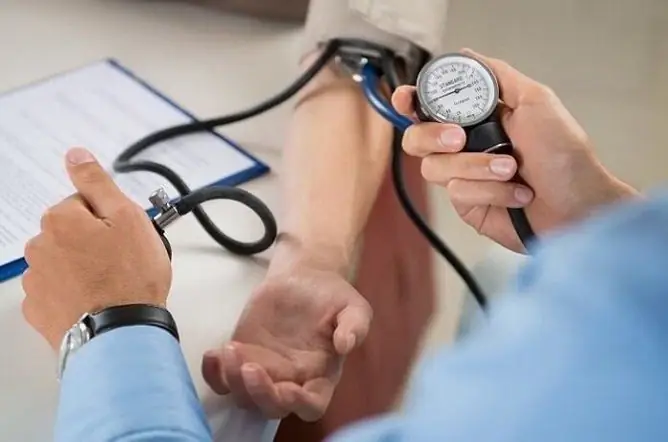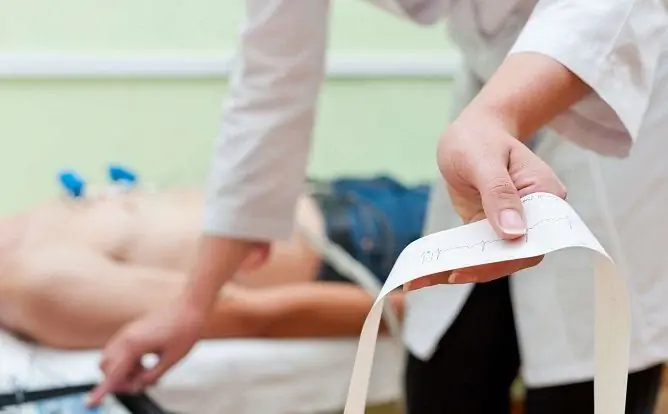- Author Rachel Wainwright wainwright@abchealthonline.com.
- Public 2023-12-15 07:39.
- Last modified 2025-11-02 20:14.
High pulse with high pressure - what to do?
The content of the article:
- The connection between pulse and pressure
- Why can there be high blood pressure and high pulse
- What symptoms accompany a high pulse with high pressure?
- What to do with high heart rate and high blood pressure
- Overview of hypertension and tachycardia
- Video
High pulse and high blood pressure are a fairly frequent combination, which, however, is not natural, that is, not in all cases of increased pressure, the pulse increases and vice versa. High blood pressure (BP) is considered to be 140/90 mm Hg. Art. and higher, a high pulse is diagnosed with a heart rate of more than 90 beats in 1 minute.

Elevated blood pressure with a rapid heart rate may be a sign of cardiovascular disease.
The connection between pulse and pressure
Heart rate and blood pressure are related. Often, with an increase in pressure, the heart rate also increases and vice versa. In some diseases, there is no such relationship between heart rate and blood pressure. So, with arterial hypertension (hypertension) against the background of increased pressure, there may not be an increase in the number of heart contractions.
Repeated often, this pathological condition can lead to disorders of the cardiovascular and central nervous system.
An increased pulse with increased pressure is a dangerous condition, for this reason, if it is detected, it is recommended to immediately consult a doctor who will conduct an examination, prescribe adequate therapy, if necessary, explain to the patient why a high pulse is dangerous against a background of high pressure, what to take in this case.
For the diagnosis, complaints and anamnesis are collected. Particular attention is paid to the diseases and factors that a person has, against the background of which pathology develops. Requires repeated measurement of blood pressure and heart rate in various positions of the patient's body (sitting, lying, standing). Electrocardiography, echocardiography, ultrasound diagnostics, computed tomography, laboratory tests, and 24-hour Holter monitoring may be required, which makes it possible to detect a number of diseases of the cardiovascular system.
Why can there be high blood pressure and high pulse
Frequent (high) pulse with increased pressure occurs both with physiological and pathological changes in the body.
A temporary increase in heart rate with an increase in blood pressure is observed with psycho-emotional and / or excessive physical stress, abuse of alcohol, coffee, tea.
The causes of high pulse and high blood pressure can be certain diseases. Such diseases include hypertension (especially with a sympatho-adrenal crisis), symptomatic arterial hypertension of various etiologies, thyroid pathology, in which there is an increase in the level of hormones secreted by it (for example, hyperthyroidism), an increase in the production of adrenal hormones (hypercortisolism), pheochromocytoma, neurosis, psychosis, and sometimes this condition occurs with a cold, accompanied by fever.
The causes of hypertension are often unclear. Risk factors are genetic predisposition, pathologies of pregnancy and childbirth, passive lifestyle, insufficient intake of calcium from food, overweight, women taking hormonal contraceptives, work at night and / or nocturnal lifestyle, climatic conditions, industrial hazards, vitamin deficiency, poor living conditions. Changes in hormonal levels in women during pregnancy, with menopause can provoke an increase in blood pressure.
The most common causes of tachycardia are disorders of the autonomic nervous system, endocrine system, arrhythmia, circulatory disorders, and the use of a number of medications. Smoking, overeating, and eating fatty and spicy foods can also lead to an increase in the number of heartbeats. The pathological process can develop against the background of diabetes mellitus, with a low level of hemoglobin in the blood, the presence of malignant neoplasms, and respiratory diseases.
What symptoms accompany a high pulse with high pressure?
Rapid pulse with high blood pressure manifests itself with the following symptoms: headache, dizziness, a feeling of pulsation in the temples, impaired coordination of movements, darkening in the eyes, the appearance of dark spots in front of the eyes, increased heartbeat, a feeling of interruption in the work of the heart, shortness of breath, muscle weakness, trembling the whole body, nausea, vomiting, hyperemia of the skin of the face.
Arterial hypertension can be asymptomatic or malosymptomatic for a long time, up to a hypertensive crisis. Its signs may be sleep disturbances, especially due to nocturia (the predominance of nocturnal over daytime diuresis). Among the complications of arterial hypertension are myocardial infarction, acute cerebrovascular accident, renal and heart failure.
With the development of a hypertensive crisis, blood pressure rises significantly, a severe headache appears (especially in the occipital region), flushing of the face, chest, flashing of flies before the eyes, increased anxiety, ringing in the ears, shortness of breath, pain in the chest, dizziness, confusion. Patients who have undergone a hypertensive crisis are prone to relapse. Complications of hypertensive crisis include edema of the papilla of the optic nerve, visual impairment (up to loss), retinopathy, disseminated intravascular coagulation syndrome, heart failure, hemolytic anemia, cerebral or pulmonary edema, and renal failure.
The duration of a tachycardia attack can range from a few seconds to several days. During an attack, the patient's neck blood vessels often pulsate.
What to do with high heart rate and high blood pressure
With an increase in pulse against the background of an increased blood pressure, it is necessary to lay down or sit down the patient (with a support under the back), provide him with complete rest and access to fresh air, loosen or remove tight clothes. If the patient has been prescribed certain drugs that he can take in such cases, he should take them. Timely first aid can significantly improve the prognosis.
Even if the patient has learned to independently eliminate attacks of increased pressure and acceleration of the pulse, which are repeated for no apparent reason, and the indicators reach high numbers, you should contact a qualified specialist, undergo an examination and, if necessary, start treatment.
What pills to take with a high pulse in combination with high blood pressure depends on what led to the development of the pathology and what clinical signs are observed in the patient.
When the pressure drops with medication, the pulse can return to normal automatically. To avoid complications, high blood pressure and pulse rates should be reduced gradually (no more than 30% of the initial level in 1 hour).
Patients may be prescribed tincture of valerian, peony or motherwort, beta-blockers, antiarrhythmic drugs, angiotensin-converting enzyme inhibitors, diuretic drugs.
Calcium channel blockers are not recommended as first-line drugs to normalize blood pressure and heart rate, as they tend to cause a temporary acceleration of the heart rate.

If the state of tachycardia and high blood pressure is frequent and even more constant, it is necessary to consult a doctor without delay
Treatment of tachycardia consists in the treatment of the underlying disease, the use of antiarrhythmic drugs. Treatment of this pathology can be conservative and / or surgical. In the latter case, minimally invasive surgery methods using local anesthesia are effective. Breathing exercises are sometimes indicated.
Overview of hypertension and tachycardia
Distinguish between systolic (upper) and diastolic (lower) pressure. Arterial hypertension is a persistent increase in blood pressure. Of all cases of hypertension, 90-95% is due to hypertension (essential hypertension), the rest of the patients are diagnosed with symptomatic arterial hypertension (renal, endocrine, stressful, arising while taking a number of drugs, etc.). Arterial hypertension is one of the most common pathologies of the cardiovascular system and is recorded in 20-30% of adults. In older patients, the incidence increases.
When determining blood pressure at home, a series of sequential measurements is carried out on both limbs (up to 10 on each arm), while an interval of 2-3 minutes must be maintained between individual measurements to restore blood flow. The results are entered in the table, after which the lowest and highest values are crossed out. Subsequently, the pressure is measured on the hand where the indicators were higher. If the blood pressure value on both hands is approximately the same, it is recommended for right-handers to measure this indicator on the left, and for left-handers on the right hand.
Tachycardia is an increase in heart rate, respectively, pulse. This condition can be physiological (with excitement, physical exertion) and pathological. Pathological tachycardia contributes to the development of coronary heart disease, myocardial infarction. Tachycardia with high blood pressure associated with a number of diseases may indicate a high risk of stroke and myocardial infarction, especially in patients over 45 years old.
Video
We offer for viewing a video on the topic of the article.

Anna Aksenova Medical journalist About the author
Education: 2004-2007 "First Kiev Medical College" specialty "Laboratory Diagnostics".
Found a mistake in the text? Select it and press Ctrl + Enter.






